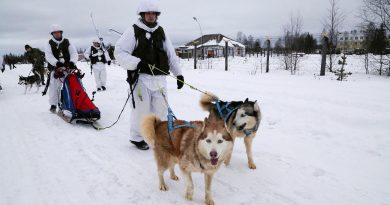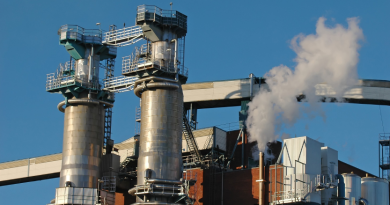Arctic presence guards against U.S. threat says Russia

President Vladimir Putin said on Tuesday Russia had vital defence and economic interests in the Arctic, citing a potential U.S. military threat from submarine-based missiles there.
Russia detained 30 Greenpeace activists protesting against Arctic drilling at Russian Prirazlomnaya offshore platform in September and they now face charges carrying seven-year jail sentences, underlining Moscow’s strong interest in the Arctic.
Putin has ordered a Soviet-era military base reopened in the Arctic as part of a drive to make the northern coast a global shipping route and secure the region’s vast energy resources.
“Not only are there major economic interests for our country there…it is also an important part of our defence capability,” Putin told a meeting of university students in Moscow.
“There are (U.S.) submarines there and they carry missiles,” the Russian leader said. “It only takes 15-16 minutes for U.S. missiles to reach Moscow from the Barents Sea. So should we give away the Arctic? We should on the contrary explore it.”
Nevertheless, Putin said Russia was unlikely to get involved in any global conflicts, particularly with the United States.
Race for resources
Russia, the world’s largest country and its second biggest oil exporter, is vying with Canada, Denmark, Norway and the United States for control of the oil, gas and precious metals that would become more accessible if global warming shrinks the Arctic ice cap.
Moscow claims a whole swathe of the Arctic seabed, arguing that it is an extension of the Siberian continental shelf.
Answering questions from students, Putin stressed the need for patriotism – a common theme in his third presidential term in which he faces growing dissent and economic problems.
“If we want to keep our identity overall, we of course need to cultivate the patriotic sentiment,” he said. “The country will not exist without it, it will fall apart from inside like a lump of sugar that has been dipped in water.”
Russia initially accused the Greenpeace protesters of piracy but later softened the charges to hooliganism. Some activists had tried to scale the Prirazlomnaya platform operated by state-owned firm Gazprom. Russia’s first offshore oil platform in the Arctic, it is expected to start production this month.
All 30 Greenpeace environmental campaigners were released on bail last month, but still face prison terms if convicted in a case that has drawn criticism from the West and is seen by Kremlin critics as part of a clampdown on dissent by Putin.
Russian geologists estimate the Arctic seabed has at least 9 billion to 10 billion tonnes of fuel equivalent, about the same as Russia’s total oil reserves.
Related Link:
U.S. Department of Defense releases nation’s Arctic strategy, Alaska Dispatch
Denmark’s Strategy for the Arctic, Blog by Mia Bennett
Canada to file Arctic seafloor claim, The Canadian Press
Sweden’s Arctic strategy criticized, Radio Sweden



